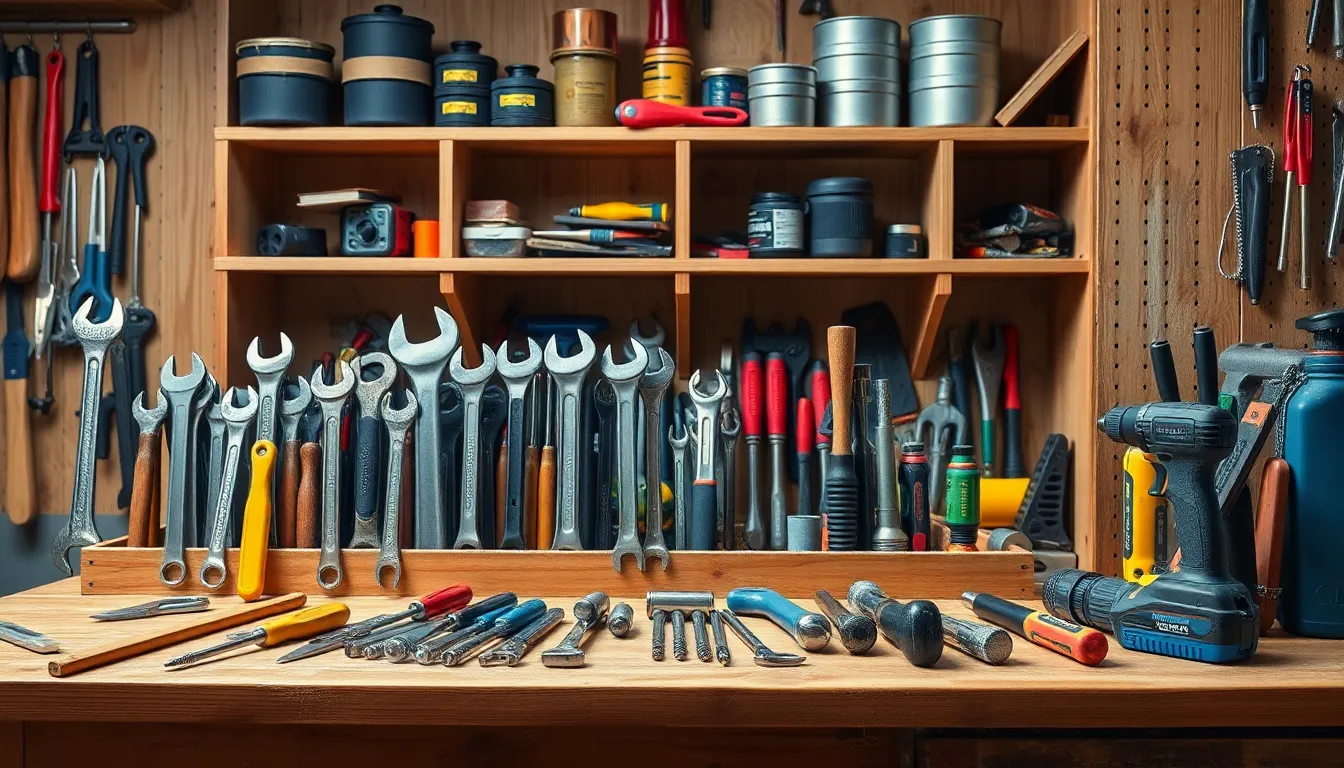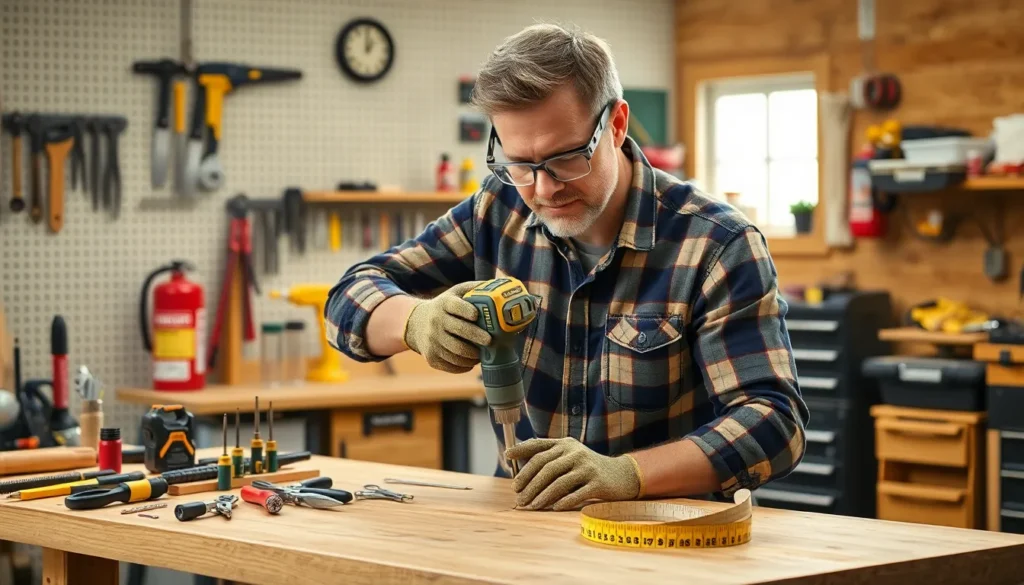Table of Contents
ToggleEvery DIY enthusiast knows the thrill of transforming a simple idea into a tangible masterpiece. But let’s face it, without the right tools, that dream project can quickly turn into a Pinterest fail. Imagine trying to build a bookshelf with nothing but a butter knife and sheer determination—it’s not pretty.
Essential Home Workshop Tools
Reliable tools make a significant difference in a home workshop. A quality power drill enables homeowners to complete tasks like hanging shelves or assembling furniture effortlessly.
Hand tools also play a vital role. A set of screwdrivers, including various sizes and types, addresses most fastening needs. Pliers help with gripping, bending, and cutting wires and materials, making them indispensable.
A sturdy workbench provides a solid surface for any project. Ample space allows for organization and efficient work. Equally important, a tape measure ensures accurate measurements, crucial for fitting and cutting materials precisely.
Safety gear cannot be overlooked. Safety goggles protect eyes from dust and debris, while gloves keep hands safe from sharp or rough surfaces. Each workshop needs a fire extinguisher to address emergencies.
Power saws, such as circular saws or jigsaws, are essential for cutting wood and other materials. Access to these tools speeds up the construction process significantly.
Storage options also matter. Having a pegboard enables efficient organization of tools, making them easy to locate when needed. Toolboxes or bins keep smaller items organized and protected from damage.
Lastly, a good set of clamps secures materials in place while working. Stability during cutting or assembly prevents accidents and ensures quality results. Selecting these essential tools sets the foundation for successful DIY projects.
Hand Tools

Essential hand tools provide the foundation for any home workshop. Each tool plays a specific role, enabling various DIY projects to come to life.
Wrenches
Wrenches are vital for loosening or tightening nuts and bolts. A standard set includes adjustable wrenches, socket wrenches, and box-end wrenches. Each type offers distinct advantages; for example, adjustable wrenches provide flexibility with different sizes, while socket wrenches deliver speed during mechanical tasks. Keeping a variety in the toolbox can ensure readiness for any repair or assembly job.
Screwdrivers
Screwdrivers serve to drive screws efficiently. A complete set contains both flat-head and Phillips-head screwdrivers for versatility. Using the right screwdriver size significantly enhances grip and reduces the risk of stripping screws. Ergonomic designs improve comfort and reduce fatigue during prolonged use. Keeping screwdrivers organized allows for easy access, facilitating smooth project execution.
Hammers
Hammers excel at driving nails into various materials. Common types include claw hammers for general tasks and framing hammers for heavy-duty work. Using the correct hammer type not only increases efficiency but also minimizes damage to surfaces. Selecting the right weight and grip enhances control and comfort. Keeping hammers within reach ensures readiness for any nailing task in the workshop.
Power Tools
Power tools streamline various tasks in a home workshop. They enhance efficiency and precision, making projects more manageable.
Drills
Drills are indispensable for creating holes in wood, metal, or plastic. A corded drill offers consistent power for tough materials, while a cordless model provides mobility. Choosing a model with variable speed settings allows better control over different tasks. A hammer drill can perform masonry drilling, useful for projects involving brick or concrete. Accessories like drill bits broaden their functionality, accommodating various screw sizes and material types.
Saws
Saws cut through materials with precision and speed. Handsaws serve well for simpler jobs, while power saws significantly reduce effort and time. Circular saws deliver straight cuts efficiently, making them ideal for sheets of plywood or dimensional lumber. Miter saws are perfect for angled cuts, great for framing and trim work. Table saws offer unmatched stability for repetitive cuts, providing a flat surface to work on.
Sanders
Sanders smooth surfaces and prepare them for finishing. Random orbital sanders work effectively on both flat surfaces and curves, preventing swirl marks. Belt sanders remove material quickly, suitable for leveling surfaces or heavy stock removal. Finishing sanders polish surfaces, ensuring a sleek finish. Choosing sandpaper with appropriate grit levels enhances the quality of work and prolongs the life of the machine.
Safety Equipment
Safety equipment protects individuals during DIY projects, ensuring a safer workshop environment. Essential items include personal protective gear and fire extinguishers.
Personal Protective Gear
Personal protective gear includes items like safety goggles and gloves. Goggles prevent eye injuries from flying debris during cutting or drilling tasks. Gloves provide hand protection against sharp edges and harsh chemicals. Dust masks are crucial for preventing inhalation of harmful particles. Ear protection is important during loud tasks, such as using power saws. It’s vital to select equipment that meets safety standards, ensuring maximum protection while working.
Fire Extinguishers
Fire extinguishers are essential for quickly addressing potential fire hazards. They should be easily accessible in the workshop, ideally mounted and labeled. A fire extinguisher rated for Class A, B, and C fires offers the best protection for various incidents, including flammable solids, liquids, and electrical fires. Regular inspections ensure the extinguisher is functional and up to code. Knowledge of how to use a fire extinguisher can make a difference in an emergency, potentially preventing significant damage.
Organization and Storage
Effective organization and storage solutions keep workshop tools accessible and projects efficient. Implementing the right systems enhances project flow.
Toolboxes
Toolboxes serve as essential storage for workshop tools, protecting them from damage and keeping them organized. Many toolboxes offer various sizes, accommodating everything from hand tools to power tools. Durable materials often withstand wear and tear, while portable designs enable easy transport to job sites. Some toolboxes feature removable trays, making it simple to access frequently used tools. Choosing stackable options can maximize vertical space in the workshop, ensuring tools remain neatly organized.
Shelving Units
Shelving units provide practical storage solutions for both tools and materials, helping maintain an orderly workshop. Various styles exist, from open shelves for easy visibility to enclosed cabinets for dust protection. Adjustable shelves allow for customized storage, accommodating items of different sizes. Heavy-duty shelving units support substantial weights, making them ideal for storing power tools and larger equipment. Organizing materials like wood, screws, and paint on shelves enhances efficiency and accessibility. Choosing shelving units with labeling options aids in quickly locating specific tools or materials.
Having the right tools is crucial for any successful DIY project. With essential equipment like power drills, screwdrivers, and safety gear, home workshop enthusiasts can tackle a wide range of tasks with confidence. The right organization and storage solutions further enhance efficiency, making it easier to access tools and materials when needed.
Investing in quality tools not only improves project outcomes but also ensures a safer working environment. By prioritizing safety and organization, DIYers can enjoy the creative process while minimizing risks. Embracing these essentials transforms any workspace into a productive haven for turning ideas into reality.




